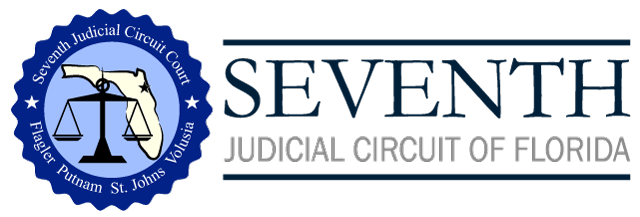Drug-Free Workplace
This drug-free workplace policy statement for the Seventh Judicial Circuit Court has been adopted in accordance with the provisions of Part 29 of Title 49, Code of Federal Regulations for required compliance with the Federal Drug-Free Workplace Act of 1988 (41 USC 701). This policy applies to all non-judicial Court personnel. Depending upon the funding source of each position, additional policies on this same subject may also apply.
It is hereby the policy of the Seventh Judicial Circuit Court to ensure a drug-free workplace. Maintaining a healthy and productive work force, safe working conditions free from the effects of drugs and quality work products and services is important to the Seventh Judicial Circuit Court, its employees and the general public of the state of Florida.
Drug and alcohol abuse creates a variety of workplace problems, including increased injury on the job, increased absenteeism, increased financial burden on health and benefit programs, increased workplace theft, decreased employee morale, decreased productivity and a decline in the quality of products and services. Therefore, the unlawful manufacture, distribution, dispensing, possession or use of alcohol or an illegal drug is prohibited in the workplace of the Seventh Judicial Circuit Court.
In carrying out this drug-free workplace policy, the Seventh Judicial Circuit Court encourages employees with drug or alcohol abuse problems to seek help through an alcohol and/or drug rehabilitation program prior to violation of this policy.
A. Employee Requirements in Complying with the Drug-Free Workplace Policy
To maintain a drug-free workplace, employees of the Seventh Judicial Circuit Court agree to abide by the following conditions:
- No employee of the Seventh Judicial Circuit Court may work, report or return to work under the influence of alcohol or any illegal drug as specified below (see subsection 4). This includes exhibiting signs of impairment such as slurred speech, odor of alcohol on one’s breath, incoherentness, reduced mental faculties or other signs of physical impairment normally associated with substance or alcohol abuse to the extent that the employee presents an unacceptable image of the Seventh Judicial Circuit Court to the public, his or her colleagues, supervisors or subordinate employees. An employee exhibiting these signs in the workplace may be required to take annual leave. An employee also may be required to take leave if, as a result of taking prescribed medication, said employee is unable to satisfactorily perform his or her assigned duties.
- No employee of the Seventh Judicial Circuit Court may, while working, use or be in the possession of any illegal drug or alcoholic beverage.
- No employee of the Seventh Judicial Circuit Court may possess, with the intent to distribute, disburse or sell alcoholic beverages or nonprescribed drugs while working. This includes the manufacture of illegal drugs or controlled substances.
- For purposes of this policy, illegal drug means any drug: (a) which is not legally obtainable; (b) which may be legally obtainable but has not been legally obtained; or (c) which is being used in a manner or for a purpose other than as prescribed.
B. Actions for Violation of Policy
For a violation of the Seventh Judicial Circuit Court’s Drug-free Workplace Policy, an employee will be subject to appropriate disciplinary action as determined by the Seventh Judicial Circuit Court based on the severity of the offense. The range of disciplinary actions include written reprimand, suspension, demotion and dismissal from employment.
In determining appropriate discipline, the Seventh Judicial Circuit Court may refer the employee to an alcohol or drug rehabilitation program. If an employee is referred to an alcohol or drug rehabilitation program, and the employee is unable to participate in outpatient rehabilitation, the employee may be placed on leave status while participating in such a program. If placed on leave status, the employee shall first be permitted to use any accumulated paid leave credits prior to being placed on leave without pay.
C. Reporting of Workplace Criminal Drug Statute Convictions
Part 29 of Title 49 of the Code of Federal Regulations requires each employee of the Seventh Judicial Circuit Court, a recipient of federal funding, to notify the Court Administrator within five days of any personal criminal drug conviction for a violation occurring in the workplace.
The Seventh Judicial Circuit Court must notify the Department of Justice of such workplace drug convictions within 10 days after receiving the employee’s notice or otherwise receiving actual notice of such conviction. The Seventh Judicial Circuit Court must also, within 30 days of receiving notice of a workplace conviction, take appropriate personnel action against the employee (see Section B).


